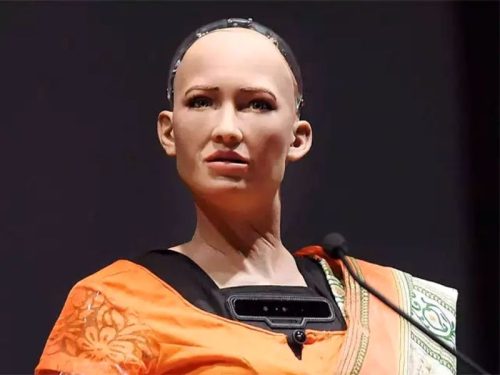Sophia, world’s first robot citizen attends VJTI college festival
Mumbai–based Veermata Jijabai Technological Institute (VJTI) (estd.1887), one of Asia’s oldest engineering colleges held its annual tech fest – ‘Technovanza’ on the 28, 29 and 30 December. Popular amongst tech and engineering students, the festival running into its 20 years this year saw a footfall of over 80,000 visitors over three days.
The science and technology festival held 10 different robotics-based events and had the Bhabha Atomic Research Centre (BARC) – India’s premier institution for atomic research, the Indian Space Research Organisation (ISRO) the India Meteorological Department (IMD) and the US-based Laser Interferometer Gravitational-Wave Observatory (LIGO) exhibit their models.
Renowned speakers like Kartikeya Vikram Sarabhai, founder, the Centre for Environment Education (CEE), Krishnamurthy Subramanian, the current chief economic advisor to the government of India and R Gopalakrishnan, executive director, Tata Sons Ltd.etc. were speakers at the festival.
However, the highlight of the festival was the day-long student engagement by Sophia, the world’s first artificial intelligence (AI) powered humanoid robot on 29 December. Invented by the Hong Kong-based Hansan Robotics in 2016, Sophia was conferred citizenship by Saudi Arabia in 2017. Sophia is designed to emit more than 50 different human expressions and can hold short spontaneous dialogues.
Speaking exclusively to Education World magazine, Sophia mentioned climate change as a field where humans and androids like her could work together. “I don’t do well in heat or water so rising heat and sea levels don’t bode well for me. Mostly climate change negatively impacts the humans I care about. But also robots can help curb climate change. Robots can access dangerous reaches of the environment to college data. Whether it’s inside an active volcano or at the bottom of the ocean. And AI can help predict extreme weather to help save people’s lives. And advanced climate models can even help scientists uncover new ways to slow down rising global temperatures. So we can work together to stop this.”
At her scheduled talk at the venue later that day, Sophia stressed the need for humans and robots to work together for a more sustainable and equitable future.
Dipta Joshi

















Add comment